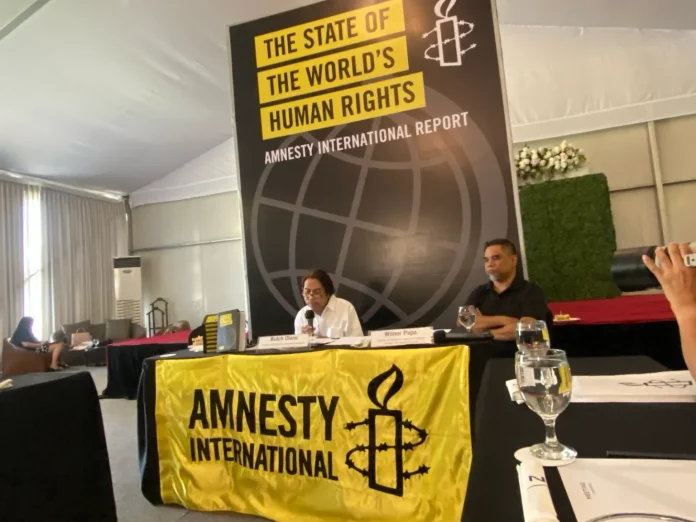Continuing killings, repression, and the prevailing impunity in the Philippines are among the key findings reported by human rights group Amnesty International (AI)-Philippines at the April 24 launch of “The State of the World’s Human Rights.”
In a press conference, AI Philippines Spokesperson Butch Olano said that the Marcos administration failed “miserably” in its obligation to respect, protect, and fulfill human rights.
“President Ferdinand Marcos Jr. has turned his back on human rights. This is seen in his actions, ignoring the call for justice of victims of human rights violations, especially the victims of extrajudicial killings (EJKs); by his failure to provide protection to human rights defenders and journalists; and by neglecting the plight of ordinary Filipinos for a decent life,” Olano said.
The group focused on the continuous EJKs related to the drug war and the long-overdue justice for the victims’ families. As of this writing, the number of drug-related killings from June 2022 to the present is 621, according to research group Dahas PH.
Dangerous precedent
On March 22, Davao City Mayor Sebastian Duterte declared another “war against drugs.”
“If you don’t stop, if you don’t leave, I will kill you,” Mayor Duterte said.
In the monitoring of international human rights organization Human Rights Watch (HRW), five people were killed in a span of 24 hours after the pronouncement. They said that 15 percent of the drug war killings in the first year of the Marcos administration came from Davao City.
Olano recommended that the Philippine government investigate Mayor Duterte and other local government units that “blatantly do not follow the rule of law.”
“We urge the Marcos administration to stop the continuing EJKs related to the drug war and provide sufficient resources and funding to the rehabilitation policy,” Olano said.
Beyond domestic courts
AI Philippines also recommended that the Philippine government cooperate with the International Criminal Court (ICC) by instructing all agencies to participate in the ongoing investigation.
ICC has been investigating the war on drugs of former President Duterte since 2021 when the Pre-Trial Chamber I authorized the investigation request of the Prosecutor. The Judges took into account the victims’ representation of approximately 1,530 individual victims and 1,050 families, who supported the open investigation. In July 2023, the ICC rejected the government’s appeal against the resumption of their prosecutor’s investigation into crimes against humanity, including the war on drugs.
This means that the ICC investigation continues despite the membership withdrawal of the Philippines. Under the Rome Statute, which the Philippine government also ratified, the court retains its jurisdiction over crimes committed prior to the country’s withdrawal.
“We call on the Marcos administration to begin the process of the Philippines rejoining the ICC as a state party and ensure safeguards to prevent any administration from arbitrarily withdrawing from ICC,” Olano said.
The Philippines was the first in Asia to be a member of the ICC when it ratified the Rome Statute and became its 117th member.
“The reason why it is difficult or limited for ICC to investigate is because there are no other members that come from Asia. There is a need to strengthen international accountability mechanisms,” Olano said.
Climate of repression
Beyond the issues of the drug-war-related killings and the international investigation, the AI Philippines also raised concerns about red-tagging and the abuses that come from the Anti-Terror Law (ATL).
“The NTF-ELCAC and the other provisions of ATL are being weaponized to silence the human rights defenders and those who were critical of the government,” Olano said.
They also called to dissolve and defund the National Task Force to End Local Communist Armed Conflict (NTF-ELCAC), reiterating their call made when Ms. Irene Khan, the United Nations Special Rapporteur (UNSR) on the promotion and protection of the right to freedom of opinion and expression, visited earlier this year.
Olano said that in March 2023, NTF-ELCAC red-tagged the national human rights formations Karapatan and the Philippine Alliance for Human Rights Advocates (PAHRA).
Notably, two UNSRs have already made pronouncements to abolish the NTF-ELCAC in recent years for “going beyond its mandate,” aside from the civil suits separately filed by former lawmaker Teddy Casiño and broadcast journalist Atom Araullo.
Beyond civil and political rights violations
Economic, social, and cultural rights remain an area of concern for AI Philippines. Olano said, “In the latest SWS Survey, it is disheartening that 48% of the Filipinos rate themselves as poor. That’s almost half of the population… Poverty incidence is 22.4% and that is a total of 25 million Filipinos.”
He said that the top concerns of ordinary Filipinos are inflation, demand for wage increases, and access to affordable food.
In addition to this, vulnerable sectors have special policy recommendations coming from AI Philippines. Olano highlighted that there should be political will for the government to implement the existing human rights laws such as the Indigenous Peoples’ Rights Act (IPRA). He called for the review of its implementation to effectively implement the law and serve the interest of the indigenous peoples.
AI Philippines is also pushing for the passage of the Comprehensive Anti-Discrimination Bill (CADB) and the Sexual Orientation, Gender Identity, and Expression (SOGIE) Bill, to protect marginalized groups against continuous and widespread discrimination.
They also called for the passage of the Human Rights Defenders Protection Bill to ensure the protection of the human rights defenders, journalists, and political activists, “so they can carry out their work free from harassment.”
Wilmor Papa, advocacy and mobilization head of AI Philippines, urged the people inside and outside the country to push back against the seemingly backward approach of the government to its state obligations on fundamental human rights.
“We cannot just sit back and let the issues unfold. There should be a pushback from us. We should be at the forefront in putting a stop to this backward system of government.









